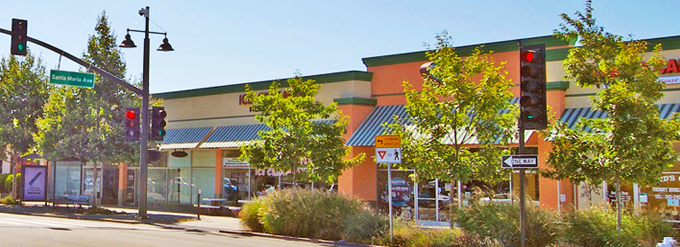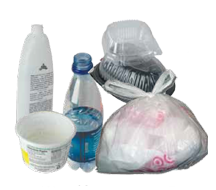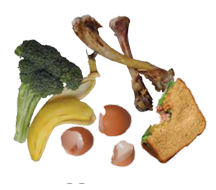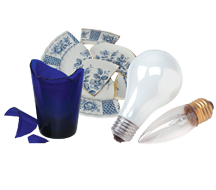
Commercial Service Program
Alameda County Industries (ACI) has a 10-year municipal solid waste (recycling, organics, garbage, and construction and demolition debris) collection agreement with Castro Valley Sanitary District (CVSan) from May 1, 2019 – June 30, 2029. ACI partners with CVSan to plan and implement Zero Waste programs designed to meet and exceed state and local mandates to prevent waste and redirect recyclables and compostables away from landfill.
Collection Schedule & Set-Out Information
- Bin and cart lids must close. Overage fees may apply to overflowing carts and bins. Contact us for information on your service containers.
- If possible, locate bins in a discrete and secure location to discourage illegal dumping. If illegal dumping does occur, contact Alameda County Public Works by clicking here or calling (510) 670-5500.
- Contact us to report graffiti on bins immediately.
Business collection is provided Monday-Saturday, no earlier than 4:00 a.m. (except within 200 feet of residential properties which is 6:00 a.m.).
No service will be provided on Thanksgiving Day, Christmas Day, and New Year’s Day. Services will be one day later than usual (through Saturday). More information on the holiday collection schedule can be found here.
California’s Mandatory Commercial Recycling Law & Alameda County Recycling Ordinance – All commercial businesses are required to sort their recyclables from garbage. Businesses that generate food scraps and food-soiled paper are required to sort organic material. Recycling and organics service must be sufficient to handle the amount of material being separated from garbage. Click here for more information on the ordinances. We can help you start or improve your Recycling and Organics collection program today!
• Schedule a Free Site Assessment/Consultation. Call CVSan at (510) 537-0757 ext. 119 or contact us to set up a site assessment of your business or property at no cost to you. CVSan and ACI staff are also available to lead trainings focused on starting new collection programs or offer refresher information on your current program for your staff.
• Commercial Bundling Program. Businesses that subscribe to plastic cart or 1-3 cubic yard metal bin service can combine any two of the three service options (recycling, organics, or garbage) into a bundled rate. Click here for more information on the ACI Commercial Bundling Program.
• Recycling & Organics Containers, Posters, Signs, & Decals. CVSan can donate a wide variety of recycling and organics containers, posters, signs, decals and customized signs to meet the needs of your business. In the event we cannot donate what you need, CVSan can help with easy grant applications to local agencies that can likely cover the cost. Click here for more information on the CVSan Container and Signage Donation Program.
• Promote Zero Waste by Becoming a 4R Star Business. Businesses are certified as “4R Star” businesses by completing ongoing activities in each of the 4R categories – Reduce, Reuse, Recycle, and Rot (organics or compost as it’s commonly known). More information about the 4R Star Program can be found here.
What Goes in the Blue Cart or Bin?
Recyclable Materials
- All plastics #1-7, lids are ok (except foam plastic*
- Scrap metal (up to 2’ & 40 lbs.)
- Aluminum foil products
- Bundled plastic bags/wrap “Bag-A-Bag”
- Metal containers
- Paper cartons
- Glass containers
- Clean paper
- Cardboard
*Polystyrene Foam Containers and Plastic Bags are Banned in Alameda County. Alameda County restaurants and establishments that serve food cannot give out serve ware or containers made of polystyrene foam (commonly referred to as Styrofoam). Alternatives include paper or plastic containers.
Alameda County stores that sell packaged foods and/or alcohol may no longer provide customers with single-use plastic bags at checkout. Bags made of recycled paper or reusable bags may be made available for 10 cents per bag. Protective bags for meat and produce will still be allowed. Learn more about the Reusable Bag Law here. Encourage your customers to bring any type of bag from home they wish.
What Goes in the Green Cart or Bin?
Food scraps, food-soiled paper products, & yard trimmings
- Fruit, Vegetables, Eggs, & Dairy
- Leftovers, Meat, & Bones
- Paper Cups
- Paper Cartons
- Coffee Filters & Tea Bags
- Paper & Cardboard Food Packaging
- Paper Towels, Plates, Napkins, & Cups
- Shredded Paper in Paper Bags
- Grass, Leaves, Flowers, Weeds, & Plant Clippings
- Branches & Clean Wood
- Cactus & Palm
Alameda County Mandatory Organics Ordinance. Businesses and institutions that generate organic material/yard waste are required to have a green cart or bin. Violators of the ordinance may be subject to citations and fines. Contact us to start or improve your organics collection service today.
Reduce your Yard Waste with Bay-Friendly Landscaping. Bay-Friendly Landscaping reduces yard waste, conserves water, and prevents pollution. Click here for more information on Bay-Friendly Landscaping.
What goes in the Gray Cart or Bin?
Landfill – Non-Recyclable, Non-Compostable, Non-Hazardous Materials
- Foam Plastic
- Juice Boxes & Pouches
- Hoses & Wire
- Non-fluorescent light bulbs
- Painted or Stained Wood
- Diapers, Sanitary Products, & Pet Feces
- Glassware, Ceramics, & Sheet Glass
- Rubber Bands & Strapping
- Medical Waste – excluding sharps, needles and unwanted medications
Dispose of Hazardous Materials Properly. Hazardous items contain harmful components and are not safe to place your bin, cart, or the landfill. Words such as danger, warning, caution, poisonous, and flammable on labels can mean a product is toxic. Click here for more information on the Commercial Hazardous Waste Disposal Program.
Dispose of Fats, Oils, and Grease (FOG) Properly. FOG that is washed down the drain can affect sewer system performance by clogging pipes and restricting flow, which can result in backups and overflows. Overflows can damage property and contaminate Castro Valley waterways. Click here for information on how to develop a fats, oils, and grease management plan or call CVSan at (510) 537-0757.
